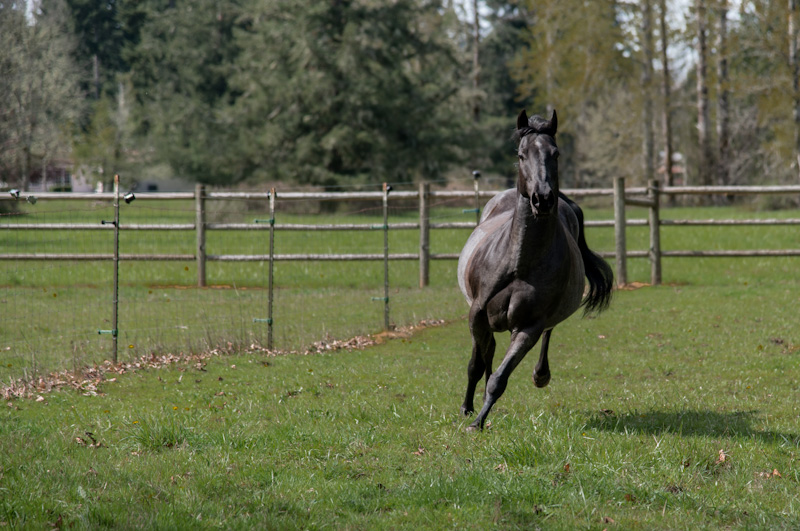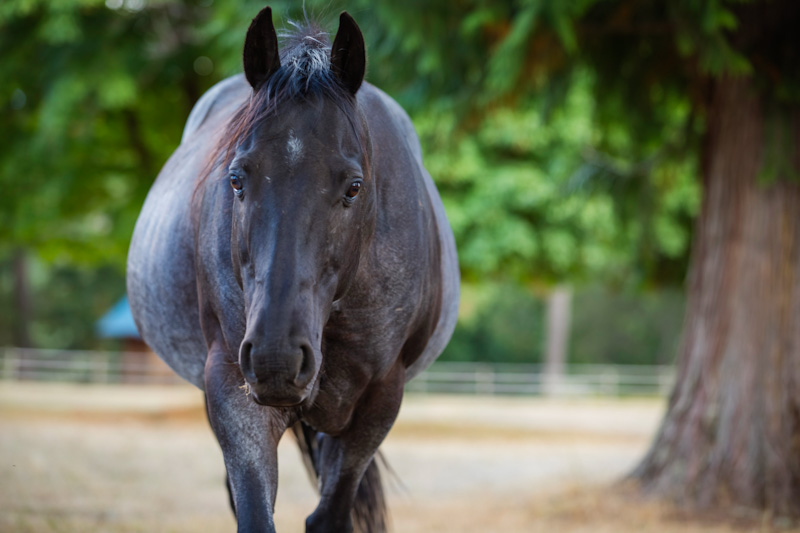A horse is a horse—of course? Oregon Supreme Court denies plaintiff horse case review

Justice is an American quarter horse and appaloosa cross. Photo courtesy of the Animal Legal Defense Fund.
It was an open and shut case of neglect. The victim in rural Oregon was starved, denied proper shelter and suffered from frostbite and grave injuries. His caregiver pled guilty in 2017 to criminal neglect. A year later, damages were sought for the 8-year-old victim to cover the lifelong medical care necessary for his physical and emotional injuries.
But in Justice v. Vercher, the plaintiff is not a child. He is a horse.
This month, the Oregon Supreme Court denied a petition to review Justice’s civil case, a claim founded on violations of state cruelty and animal laws. The suit looked to establish that as a victim, Justice, an American quarter horse and appaloosa cross, had the right to sue for damages just as a human can in that state.
“I’m disappointed by the Supreme Court’s denial. We were hopeful and optimistic that the Oregon Supreme Court would grant review,” says San Francisco-based Matthew Liebman, the lead attorney for Justice. “But I don’t know if I’m surprised.”
Geordie Duckler, the Portland, Oregon-based attorney for the defendant, wasn’t surprised either. “Just the outrageousness of the idea that an animal could have that right and that the animal could sue on its own behalf,” he says, “it’s wrong on so many levels.”
Legally things, not legally persons
In all 50 states, animal cruelty is a felony. However, animals generally are considered property—legal things and not legal persons, according to the Animal Legal Defense Fund.
However, specific laws and decisions in Oregon encouraged Justice’s legal team to pursue the case.
While Justice was a victim of neglect, victims of abuse in Oregon have the right to sue their abusers. Also, the state’s laws recognize animals as “sentient beings capable of experiencing pain, stress and fear” that could be “victims” of a crime.
“We saw this case not only as an opportunity to get justice for an individual injured horse but also to put forward the question of who has legal rights, of who is a legal person and who ought to be before the law with the capacity to file a lawsuit,” says Liebman, an associate professor and the chair of the Justice for Animals Program at University of San Francisco School of Law.
In Oregon v Newcomb, the state supreme court recognized that animals are different from other types of property, with protected interests under the law: “A person can be as cruel or abusive as she wants to her own stereo or folder and can neglect the maintenance of a car to the point where it will not operate, without legal consequence. The same is not true of an animal that a person owns or has custody of or control over.”
“Decisions like that made it seem like a jurisdiction that might be more amenable to recognizing not only criminal protections for animals under the law but also create civil pathways to pursue a case in tort; not just relying on the monopoly that the state holds over enforcement and being able to get redress beyond just criminal punishment,” says Delci Winders, an associate professor of law and the director of the Animal Law and Policy Institute at the Vermont Law and Graduate School, who carefully watched the case.
 Justice’s case is unique in that it’s the first time an animal filed suit against someone based on a criminal conviction. Photo courtesy of the Animal Legal Defense Fund.
Justice’s case is unique in that it’s the first time an animal filed suit against someone based on a criminal conviction. Photo courtesy of the Animal Legal Defense Fund.
Nothing unconstitutional
Legal animal personhood is a hot topic. For about 10 years, the Nonhuman Rights Project has been filing litigation through writs of habeas corpus, maintaining that intelligent animals like chimps and elephants have a right to liberty. In a 2022 case, the New York Court of Appeals ruled that Happy, a 46-year-old elephant who resides at the Bronx Zoo, does not have common law rights to liberty as a person does, and was not being illegally confined.
Other groups like People for the Ethical Treatment of Animals also have made attempts to name animals as plaintiffs. In 2018’s Naruto v. Slater, the 9th U.S. Circuit Court of Appeals ruled that Naruto, a photogenic crested macaque in Indonesia, had no rights under the Copyright Act to the viral selfies he took with a photographer’s camera.
In 2004, attorneys filed Cetacean Community v. Bush on behalf of the world’s whales and dolphins impacted by Navy sonar, alleging violations of the Endangered Species Act, the Administrative Procedure Act and Marine Mammal Protection Act. The court concluded that cetaceans did not have a right to sue because the language of those laws doesn’t specifically include them—but if “Congress and the president intended to take the extraordinary step of authorizing animals as well as people and legal entities to sue, they could, and should, have said so plainly.”
And in 1979, the Sierra Club and other humans brought action in the name of the palila bird species against the Hawaii Department of Land and Natural Resources for violating the Endangered Species Act. The case stated that DLNR ruined the endangered birds’ habitat by keeping feral sheep and goats on the same land. The birds won, with the court finding the state in violation of the ESA and ordering the removal of the feral animals through a public hunting campaign.
“The court never addressed the question of the palila’s ability to sue or have standing,” says Winders, a vice chair of the ABA’s Animal Law Committee in the Torts Trial & Insurance Practice division.
Profound implications
Justice’s case is unique in that it’s the first time an animal filed suit against someone based on a criminal conviction, Duckler says.
The case stems from an incident in 2017 when a neighbor found the horse, then known as Shadow, profoundly emaciated, and persuaded owner Gwendolyn Vercher to take the horse to the vet. The vet determined the horse was 300 pounds underweight, lethargic and suffered from lice, frostbite and other ailments. The horse was rehoused at a rescue organization, Sound Equine Options. In July 2017, Vercher pled guilty to first-degree animal neglect, was put on probation and agreed to pay for the costs of the horse’s care prior to the decision date.
In 2018, SEO Co-founder/Executive Director Kim Mosiman, filed a negligence claim against Vercher on behalf of the horse, by then renamed Justice, based on Oregon’s anti-cruelty statute. However, the trial court was concerned about the “profound implications” of allowing an animal to sue and dismissed the case. It awarded $1,500 in attorney’s fees to Vercher.
The case headed to the Oregon Court of Appeals, and Duckler estimates that about 10 amicus briefs were filed. While most supported Justice, two briefs opposed the petition for damages including one filed jointly by the Oregon Farm Bureau Federation, the Oregon Cattlemen’s Association and the Dairy Farmers Association.
In dismissing the case, the court found “only human beings and legislatively created entities are persons with the capacity to sue under Oregon common law.” However, the court emphasized that Oregon might someday recognize an animal as a legal person, but the legislature—and not the courts—was the correct body to make that call.
The plaintiff then petitioned the Oregon Supreme Court.
Two more amicus briefs were filed. One, signed by legal scholars including Laurence Tribe, Harvard Law professor emeritus, and Saskia Stucki, a senior research fellow at the Max Planck Institute for Comparative Public Law and International Law, stated that “nonhuman animals have numerous legal rights under Oregon and federal law.”
The other, written by international animal law scholars including Rajesh Reddy, director of the Animal Law Program at Lewis & Clark Law School, argued that the case should be heard to make sure U.S. jurisprudence keeps in step with animals being recognized as legal persons in Argentina, Ecuador and Columbia.
The review was declined.
“Animals can’t have interests,” Duckler says. “They can’t have standing. They can’t have capacity. They can’t be represented by others.”
Winders disagrees. “It was not a frivolous lawsuit,” she says. “It was based on a good faith extension of existing law. The logic of it was really strong.”
Justice’s lead attorney Liebman is unsure of the path forward. “It is certainly disheartening to lose a case like this in a jurisdiction where you thought it had a shot,” he says. “It may simply be the case that judges just aren’t ready to accept a more robust legal status for animals.”
But Duckler believes another case like Justice the horse is in the foreseeable future and that animal rights organizations are venue shopping for a state where the legislature and the judiciary agree that animals are sentient beings with rights.
“They’re probably fishing around for another state to do something like this in and hope for that confluence,” he adds.
Updated on March 30 to clarify that the decision in the New York Court of Appeals case involving Happy the elephant was decided on common law grounds.



